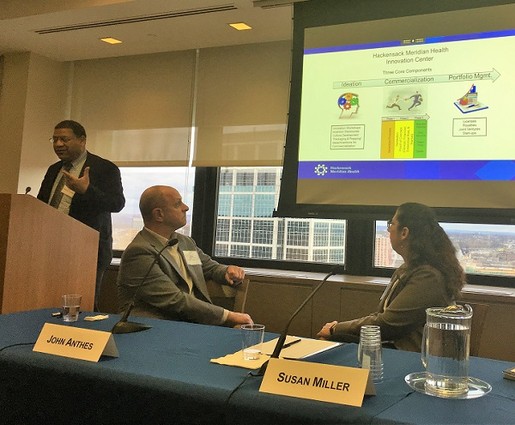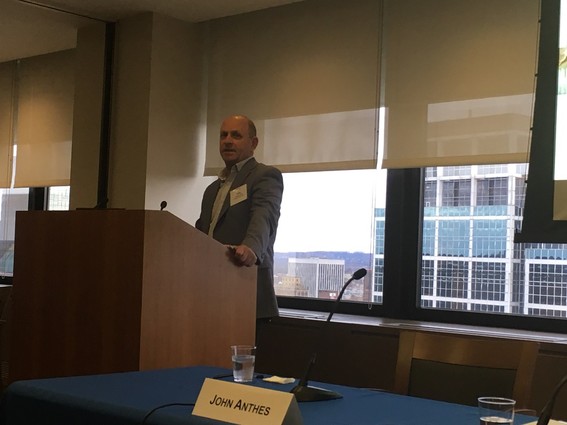New Jersey Corporate Innovation Centers Want to Connect with Startups, Panelists at ACG New Jersey Say, Part One.
In April, the Association for Corporate Growth (ACG) New Jersey held an event that featured a panel of corporate incubator execs who discussed their programs and how they work with startups.
The event, titled “The Future is Now: Corporate Innovation Centers Connecting with Early Stage Investors,” was hosted by Mark S. Kuehn and Frank T. Cannone, both from the Newark office of the Gibbons P.C. law firm. Mario Casabona, investor and founder of Kinnelon-based TechLaunch and Casabona Ventures, had assembled the panel, and he served as the moderator.
Participating in the panel were John C. Anthes, director of Celgene Corporation (Summit); Albert Baker, corporate director, life sciences and innovation, Hackensack Meridian Health (Edison); Susan M. Miller, program manager, mobile networks, at Nokia Bell Labs (Murray Hill); and Michael Robortaccio, director, corporate development, Avis Budget Group (Parsippany).
In this first part of a two-part story, we cover the presentations by Hackensack Meridian Health and Celgene Corporation, and tomorrow’s article will discuss those of Nokia Bell Labs and the Avis Budget Group.

Hackensack Meridian Health
Baker spoke about this hospital system’s $25 million fund and incubator, which was set up with the New Jersey Innovation Institute (Newark). The “Agile Strategies Lab,” as the joint effort with NJII is known, has looked at dozens of ideas from startups and from inside the company.
A self-described Jersey boy with Silicon Valley experience, Baker said that, after the merger between Hackensack and Meridian, “we created an innovation arm” for the combined company. “Innovation is often seen as just technology, but on the human side it’s about how we deliver care, and on the technology side it’s how we enable care and make it more accessible.
“We are working with lots of startups, typically early-stage startups. We are guided by the needs within the system, and we’re pushing strategic relationships and establishing strategic relationships with startups.”
Baker noted that, the company is fostering a culture of innovation within its hospital network, and is starting to have “physical touch points within every hospital, where team members can come.” These are physical spaces where folks can work as a team to solve problems, he said. “Our team members are incredible because they are always thinking about better ways to deliver care.”
Hackensack Meridian Health is also looking at bundled treatments in an effort to address the costs of healthcare delivery. And it is considering new technologies for narrowing and controlling those costs, Baker said. “We are working with providers to actually take on more risk. We are doing personalized medicine on the cancer side, and we have a partnership with IBM Watson [Armonk, N.Y.] that is going to be an integral part of that.”
From an investment point of view, the company has identified specific problems, such as how the system can better engage with patients and their family members. For example, when a family comes into the ER, they need better information about what comes next in the patient’s care. Hackensack Meridian Health is also reaching out to extend the points-of-care to patients after they’ve left the hospital and are in need of care at home.
“We are a fairly new fund and a new group, but I’ve been amazed at how much progress we’ve made in a year,” Baker said. He noted that the incubator has a program in which startups pre-pitch to a small panel. “I’d like to say we are easy and caring, but we are not.” In fact, the program is very rigorous, really testing the ideas that are presented, and the participating startups have to be clear and precise about the problems they’re seeking to solve. Baker said that he always asks startups: “If you don’t want to change the lives of a billion people, why are you doing it?”

Celgene Corporation
Anthes, who heads Celgene’s Thomas O. Daniel Research Incubator and Collaboration Center, told a story that had occurred before he joined this global biopharmaceutical firm. “I asked why would anyone want to come to New Jersey for an incubator? And one of the directors there said, ‘We are Celgene,’” and Celgene supports New Jersey. “I said I don’t want not to drink the Kool-Aid, but we really have to differentiate ourselves if we really want to open an incubator.” And so they have.
Anthes credited Bob Hugin, formerly executive chairman of Celgene and now a candidate for the U.S. Senate, with providing the impetus for getting the incubator off the ground. Hugin wanted to know why people were going to hubs like New York, San Diego and San Francisco for incubators. And he asked, “Why not New Jersey?”
Celgene is providing fully functional lab space to support growing biotech companies. The company is looking for disruptive technologies, not just something that will pay the rent. “We want to really give companies a chance, and to enhance the New Jersey bio-ecosystem.”
Celgene believes that it can generate some “hybrid vigor” by engaging young entrepreneurial companies. Referring to the 2017 McKinsey report titled “Reseeding the Garden State’s Economic Growth: A Vision for New Jersey,” Anthes said that one thing it recommended was providing functional space and incubators.
This facility, which began construction August 17, comes at a critical time for New Jersey’s economy, Anthes said, and Celgene has done its homework. “We went throughout the state. We’ve talked to both the private and public sector for the incubator.” It’s located on the Celgene campus, and covers 16,000 square feet, including labs, conference rooms, huddle rooms and offices. The labs will be biocentric, with four tissue culture suites, as well as benches, equipment, and the collaboration center, he said.

